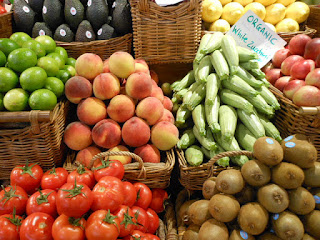If you’re trying to get to the bottom of all the current arguments about whether organic food is better for you, the first thing you might consider is just arming yourself with some facts.
What Makes that Orange Organic?
Maybe a better question is to ask is, what is not organic?If the product in your hands is labeled “natural,” “free-range,” or “hormone free” – you are about to purchase something that isn't organic. These are just food labeling terms, and law does not regulate them.What the law does regulate is the certification program that allows something to be called “certified organic.” Products bearing that organic seal are required to be grown, harvested and processed following certain standards. These standards include strict limitations on amounts of residues of antibiotics, hormones and pesticides. They also must not be treated with synthetic pesticides, or ionizing radiation. (They can, however, be treated with naturally occurring substances that repel pests.)So, let’s say you actually do have a certified organic product in your hands. If you buy it and eat it, is it better for you than its counterpart that was cultivated using conventional means?
Does Organic Food Have a Higher Nutritional Value?
There is no definitive answer to this at the present time, other than a few supporting studies reporting that organic fruit and vegetables have slightly higher levels of vitamin C, as well as trace minerals. The term “higher” is relative, however. The differences are so slight that it is arguable as to whether a diet of only organic foods would provide a benefit.Organic produce does have a much higher healthful impact on our environment, though. Organic methods of farming pay attention to the health of the soil, emphasizing the return of organic matter to it, as well as preserving local and heirloom varieties of fruit and vegetables that would otherwise disappear.Consequently, if you follow the thought process that the environment influences your health, you can agree that eating organic is better for you – even though it may not necessarily be more nutritional for you.
Why is Buying Organic so Expensive?
While the argument about whether organic food is better for you rages on, you can decide right now if you like the idea of consuming less chemicals from conventional fertilizer and pesticides, as well as supporting production systems that are less impactful to the environment. If that’s the case, organic food is a choice for you. If your like me, I’m still on the fence about this whole organic thing and I just can’t pay the price to go all organic. The sale of Organic products has grown quickly in the last few years. Since 2010, the Organic Trade Association estimates that sales of organic food have increased 12 percent, to $12.4 billion. And not everyone buys organic for the health benefits. Some people choose the green sticker for social or economic reasons. Others simply think the food tastes better. But if you’re buying it solely for health reasons, I think that your money is probably better spent elsewhere.
Why is Buying Organic so Expensive?
While the argument about whether organic food is better for you rages on, you can decide right now if you like the idea of consuming less chemicals from conventional fertilizer and pesticides, as well as supporting production systems that are less impactful to the environment. If that’s the case, organic food is a choice for you. If your like me, I’m still on the fence about this whole organic thing and I just can’t pay the price to go all organic. The sale of Organic products has grown quickly in the last few years. Since 2010, the Organic Trade Association estimates that sales of organic food have increased 12 percent, to $12.4 billion. And not everyone buys organic for the health benefits. Some people choose the green sticker for social or economic reasons. Others simply think the food tastes better. But if you’re buying it solely for health reasons, I think that your money is probably better spent elsewhere.


No comments:
Post a Comment